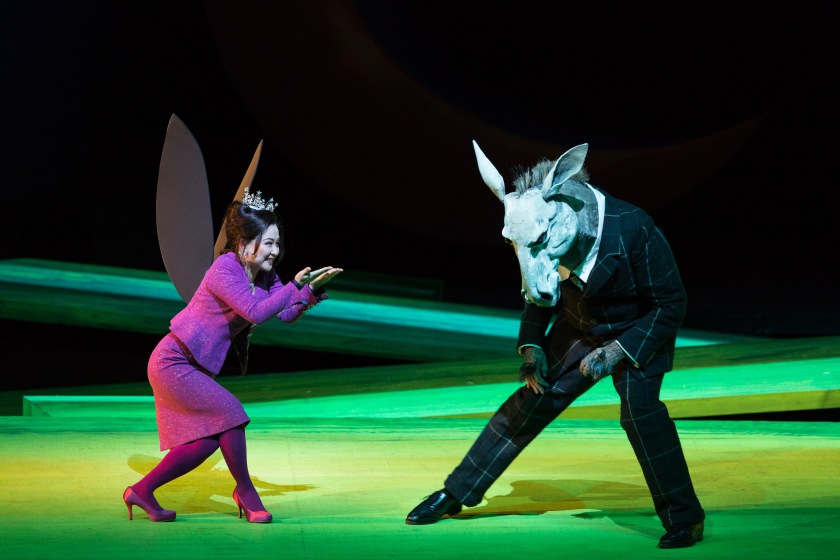
God bless the internet.
Weathering the lockdowns of COVID-19 may have robbed us of in-person live performance, but there is so much to see and hear online. The availability of free opera from a variety of sources has been amazing, from the Metropolitan Opera to Salzburg to the Vienna State Opera. I particularly enjoyed Vienna’s production of “Ariadne auf Naxos” featuring a very young Lise Davidsen as Ariadne and the wonderful Zerbinetta of Erin Morley. But what made it special was a particular feature that was so obvious, but which I had never seen done before. In this production which, judging by the costumes in the Prologue, appeared to be set in the early 1920’s, the Composer, sung by the excellent mezzo Rachel Frenkel, was on-stage throughout the opera proper. It makes a great deal of sense—it is the Composer’s opera after all, and while he had nothing to sing or speak, his attentiveness in “cueing” the singers was amusingly apt. The high point came when he “accompanied” Zerbinetta at the piano during her big aria. While the actual music came from the orchestra pit, Ms. Frenkel was so accurate in her keyboard locations throughout this long piece that I’d have to think she’s a pretty skilled pianist offstage. And the ending of the opera, which saw Zerbinetta and the Composer together as the earthly counterpart to Ariadne and Bacchus, was sweet indeed.
I had been thinking I wasn’t the Janacek fan I used to be until I recently saw the San Francisco Opera production of “The Makropoulos Affair.” When I last attended a Met performance a couple of years ago I longed for the opportunity to see the opera in HD. Since the springboard of the plot is a law suit involving an estate, it’s a very “talky” work that demands subtle acting that’s not always visible from the Family Circle. The SFO production certainly delivered with a uniformly excellent cast. While Karita Matilla, as the 337 year-old heroine, was a bit more Norma Desmond-ish than I would have liked, you couldn’t have asked for more musically. Bravi tutti!
Theater is thriving on the internet, and I have enough stockpiled links to performances to keep me busy for the next five decades. Some were especially enlightening—a regional production of “Fun Home” that proved this work loses its necessary intensity when performed on a proscenium stage instead of in the round as I saw it on Broadway, and a British production of Stephen Sondheim’s “Merrily We Roll Along” which I particularly enjoyed. I had never seen this musical before though I own three different cast recordings, and it was especially gratifying to finally experience the intended dramatic settings of the songs.
Of course the big event of this COVID-19 interlude was the premiere of the taped performance of “Hamilton” on Disney Plus featuring the show’s original cast. This was my second time around for “Hamilton”—I was fortunate to have seen it live on Broadway about 18 months ago by way of a win in the show’s perpetual ticket lottery. That performance’s strengths differed somewhat from the taped version—I had the benefit of a tall, handsome Hamilton who somewhat outshone the shorter, slighter, balding actor who played Burr, and while the electric give and take between audience and actors is a given in live theater, in “Hamilton” it was off the charts (Yes, the line “Immigrants, we get the job done” brought down the house). However, all bets were off at the juncture of “The Room Where It Happened” when Burr tore into that number like nobody’s business, making it the best performed part of the show. I missed that level of excitement in the taped version as well as a more consistent view of the full stage in order to see how inventively the chorus is used. Nevertheless this was more than compensated for by the superb performances of the original cast, especially that of Leslie Odom, Jr. as Burr. He had me with his melting version of “Dear Theodosia,” and it was easy to see why he, along with Renee Elise Goldsberry as Angelica Schuyler and Daveed Diggs as Thomas Jefferson won Tony Awards.
But without a doubt what I’ve most enjoyed during live performance exile was the National Theatre’s “A Midsummer Night’s Dream” directed by Nicholas Hytner. This was an immersive, anything-goes presentation with aerial stunts, the former Brienne of Tarth (Gwendoline Christie) as Titania and a quartet of lovers in which the girls seemed more interested in each other than in their interchangeable boyfriends. However, the neatest trick of this production was flipping Oberon’s and Titania’s lines so that he, not she, falls in love with the donkey-fied Bottom. It was so divinely silly, and Hammad Animashaun, braying nicely as Bottom, and especially Oliver Chris as the besotted Oberon, were simply superb. But above all, a special nod goes to whomever came up with the idea of using Beyoncé’s “Love On Top” as “their” song—he or she deserves both a bonus and a raise. Simply wonderful.
Stay safe everyone. Till next time.

